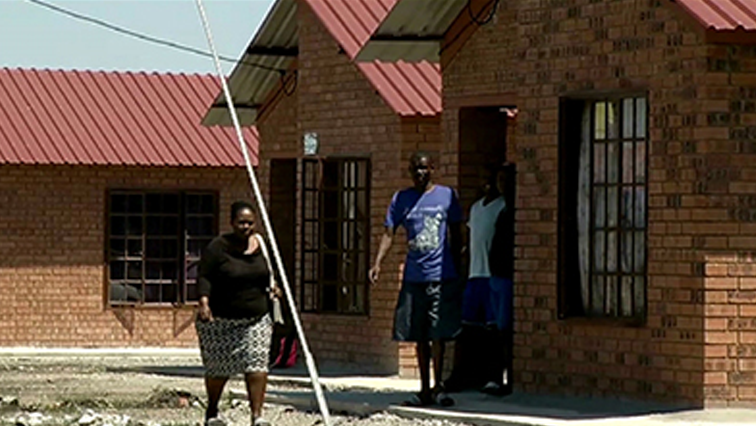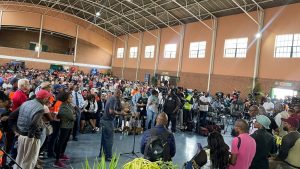Fraudsters are targeting houses of deceased people in Soweto, Gauteng, which they sell with the help of corrupt public servants using fraudulent state documents.
SABC News spoke to a number of families who have been fighting for years to get their houses back. The families have approached their municipalities, the police and their counsellors to no avail.
House number 1008 on Magwaba Street is in a state of disrepair. The four-roomed structure is full of cracks and in need of a serious overhaul and painting.
The perimeter wall looks like it could fall down at any time. But despite its current state, the house is at the centre of a battle between beneficiaries and the new owner.
Charles Ngobeni was just a child when his parents took him and his sister to Limpopo. They left Ngobeni’s other brother with a tenant who was renting a backroom.
Thirty years later in 2013 they returned to the house only to find that the tenant had sold the house. The new owner wanted to evict them, claiming she had been paying municipal services for the house.
They were told that the only way for Ngobeni and his siblings to continue living in the house was for them to pay a monthly rent of R1 500. Out of desperation, the Ngobenis agreed.
“We entered into an agreement with the new owner and the councillor that we will pay R1500. My brother went to the bank to borrow money to buy this house. He borrowed 150 000 and when he brings the money the owner changed the price to 270 000. Then from there we have been paying R1 500 from 2013 until now.”
The Ngobenis are not the only ones in this predicament. Five streets away, Busisiwe Twala is fighting to gain ownership of the house her aunt left her. Twala’s aunt did not have children, so the family agreed that she would go and stay with her in Chiawelo. Her aunt later died.
In 2014 after living in the house for over 30 years she was threatened with eviction. The threats came from the child of her aunt’s ex-boyfriend who claims the house belongs to her. Twala has since been forced out of the house by the woman and has settled in a shack in the backyard. She says it’s been difficult.
“I’m sick now. I have high blood pressure because of the issue of this house. We didn’t change the papers and they should stay away from this house. This house is not for sale and the master of high court has resolved this issue that the house should belong to my family.”
Promise Moloko, who stayed in her house since 1958, says in the past weeks strangers have been visiting the property. They say they want to view it because it is on sale. She says that prompted her to visit the local municipal offices to enquire about the status of her house. She says since her husband past away in 2003 they never had any problems.
Moloko was told that the system could not find her name. She says her worry is that the title deed says her husband was not married, but they have a marriage certificate.
“The title deed says unmarried, but there is a marriage certificate. Then when time goes on people would arrive here telling us they are here to view the house, and when we ask why they are viewing the house they say because it’s on sale. I don’t have any idea that the house is on sale. I don’t know what to do. For now I want this house back because this is my family’s house. I grew up in this house. I want the house to be under my name because now it’s under my husband name, Paulos Moloko and I want my name Promise Moloko because we were married. “
Community members say this is a scam involving public servants including officials from the Housing Department, Deeds Office and the Master of the High Court. Communities say fraudsters first approach a local municipal office to find out who owns the house.
After obtaining documents relating to the ownership of the house, they proceed to the Deeds Office to fraudulently obtain a title deed. They then approach the court and again fraudulently obtain an eviction order. Community leader, Freddy Mhlanga, claims municipal ward Councillors are also involved.
“We found that also the estate agents are also involved and there are court orders that are fraudulent and the deeds office, there are officials who are involved because these people come with fraudulent tittle deeds claiming houses and they are harassing the beneficiaries.”
However, Councillor for Ward 11 in Chiawelo Meisie Maluleke denies any involvement in the fraudulent selling of houses. But she acknowledges that this practice exists, and that it was there before she was elected ward councillor.
“Let them come forward and say Councillor you sold this house and the community knows too well that it is not true. The families themselves they sell these houses and the grandchildren not the Councillor, the Councillor doesn’t come in their houses. How do I know this house has a problem, I don’t know. I can’t sell somebody’s house and people must stop lying.”
The Gauteng Department of Human Settlements says it is still investigating the matter.






